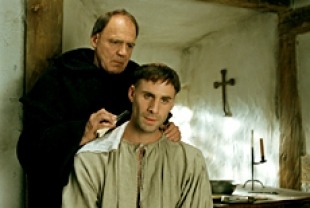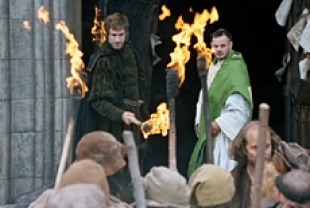The life of Martin Luther (1483-1546) was filled with inner compulsions, outward battles with the Catholic Church, and the forging of a distinctive form of Christian faith and a reliance on the Bible as the Word of God. Director Eric Till and screenplay writers Camille Thomasson and Bart Gavigan opt to give us an ambitious and wide-ranging overview of the man who put the Protestant Reformation in motion, rather than just focusing on the crucial years of his crusade against Rome.
For those who are unfamiliar with Luther and his personal strengths and weaknesses, this biodrama certainly will be extremely informative. It’s not very often that major figures of the Christian faith are portrayed in feature films, so we are thankful for this drama, especially because it tells the story of religious differences within the church on the larger canvas of a very volatile period of European history rife with political unrest and class divisions.
Martin Luther (Joseph Fiennes) is planning on being a lawyer when he is caught in a terrible lightning storm and becomes convinced that he is supposed to be a monk. His stern father is disappointed with this choice, but Martin's spiritual mentor at the monastery, Father Johann von Staupitz (Bruno Ganz), is very pleased with his sharp mind and intense devotion. He sends the young monk to Rome for what will turn out to be another life-changing experience. Luther is appalled by what he sees in the Holy City, especially the Catholic Church’s practice of selling indulgences whereby people are told they can buy their salvation and free deceased relatives from purgatory.
Back in Germany, Luther studies at the university in Wittenberg and becomes a professor of theology. In his classes and his writings, Luther emphasizes the importance of faith over good works. He wins the support of the local prince, Frederick the Wise (Peter Ustinov), and soon has a large following among the local peasants who listen to his sermons.
Meanwhile in Rome, Pope Leo X (Uwe Ochsenknecht) needs to raise money to build St. Peter’s Basilica. He intends to do this by selling a special indulgence. Hearing the arguments of Brother John Tetzel (Alfred Molina) in Germany, some illiterate members of Luther’s congregation decide to spend their meager funds on indulgences. Luther is outraged when he discovers this and responds by posting 95 theses on the door of the Castle Church in Wittenberg delineating his reasons why he sees the practice of indulgences as erroneous theology and an abuse by Rome. This material is reproduced by the new Guttenberg printing press and reaches a much wider audience than anyone ever expected it to.
Realizing that Luther is a rebel within the ranks, Cardinal Cajetan (Mathieu Carriere) demands that he recant his teachings. Then in 1521, the Pope excommunicates Luther. The reformer takes sanctuary with Prince Frederick and later is guaranteed a safe escort to the Imperial Diet of Worms for a meeting of the German princes, many of whom support him. There Luther stands before Emperor Charles V (Torben Liebrecht) and declares: "Unless I am convinced by Scripture and plain reason — I do not accept the authority of the popes and councils, for they have contradicted each other — my conscience is captive to the Word of God. I cannot and will not recant anything for to go against conscience is neither right nor safe. God help me. Amen."
The rest of the film deals with Luther’s translation of the New Testament into German, making it available to non-priests for the first time; his vehement response against the Peasants Revolt in which many people, emboldened by reformers to confront the church and princely ruling class, are killed; and his marriage to Katharina von Bora (Claire Cox), a former nun. Joseph Fiennes conveys Luther's intensity and devotional zeal, though perhaps not enough of his legendary idiosyncracies. But the real scene stealers are Peter Ustinov and Bruno Ganz as his two guardian angels.
The only extras on the DVD are the theatrical trailer and some brief interviews with actors Joseph Fiennes, Peter Ustinov, Alfred Molina, and Claire Cox.

